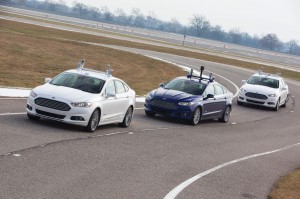
Research shows that Asia is a hotbed for interest in autonomous vehicles to help with improve the efficiency of transportation.
Despite safety concerns about the potential for equipment failure, drivers in the developing automotive markets of Asia have high expectations for autonomous vehicles.
“Recent advances in autonomous vehicle technology have helped bring self-driving vehicles to the forefront of public interest,” said Brandon Schoettle of the University of Michigan Transportation Research Institute.
“Self-driving vehicles are commonly envisioned to be the ultimate, full embodiment of connected-vehicle technology, an area that is currently the focus of several large research projects and government support,” he said.
During the Global Auto Forum in China last month, a panel of experts predicted that the Chinese market could quickly become a leader in the deployment of futuristic autonomous vehicle technology because of the keen interest in new technology among young Chinese consumers and government interest at both the local and national level in easing congestion in China’s sprawling cities.
The interest new technology in countries such as China, now the world’s largest market for new vehicles, and India, a market for which global automakers have increasingly high hopes, is likely to spur further investment in vehicle to vehicle communications and autonomous driving technology where at least some of the decisions involved in piloting a vehicle are handed off to high-speed, data-driven computer networks.
During the Intelligent Transportations Systems World Congress in Detroit this past September, Singapore was singled out as one of the major urban areas leading the way in adopting and adapting sophisticated technology to improve its transportation network, including highways carrying private cars.
Schoettle, and his colleague Michael Sivak, said UMTRI expanded its original survey to include more than 1,700 respondents in India, China and Japan. The original UMTRI study had surveyed public opinion regarding self-driving vehicles in the U.S., Great Britain and Australia.
(New vehicle buyers gobble up trucks, SUVs and luxury cars. For more, Click Here.)
The new survey found that about 87% of respondents in China and 84% in India have positive views regarding autonomous and self-driving vehicles, compared to 62% in Australia, 56% in the U.S., 52% in the U.K. and 43% in Japan. Half of the Japanese respondents were neutral, while the U.S. registered the highest percentage of negative views 16% among the six countries.
More than 80% of respondents in China, India and Japan believe that self-driving vehicles would reduce both the number and severity of crashes, compared to roughly 70% in the U.S., U.K. and Australia, according to the UMTRI study.
The Chinese and Indians are also more optimistic that autonomous technology would lead to less traffic congestion with 72% of respondents in both countries agreeing, while 74% of the respondents in India and 68% of the respondents in China also agreed the autonomous technology would reduce travel time.
(Click Here for details about the passing of Tom Magliozzi.)
On the other hand, 56% of Japanese respondents and less than 50% in the U.S., U.K. and Australia believe it would ease congestion. Likewise, less than 50% of respondents in those countries agree that it would shorten travel times.
Although more respondents in China and India expressed favorable views regarding the benefits of self-driving cars, the two countries differ when it comes to concerns about riding in a completely autonomous vehicle.
Roughly 79% of Indians said they would be very or moderately concerned, compared to 49% of Chinese. Among the other countries, the results were 67% for the U.S., 57% for both Australia and the U.K. and 52% for Japan.
(To see why Hyundai and Kia were fined a record $100 million, Click Here.)
Chinese and Indian respondents were more concerned about equipment failures, system and vehicle security from hackers, data privacy tracking and interacting with pedestrians and bicycles than those in the study’s other countries.
Nonetheless, much higher percentages of Chinese, 96%, and Indians, 95%, are at least slightly interested in owning a self-driving vehicle, compared to those in Japan, 77%, Australia, 68%, the U.S. 66% and the U.K., 63%.
“Respondents in the six countries surveyed, while expressing high levels of concern about riding in vehicles equipped with this technology, mostly feel positive about self-driving vehicles, have optimistic expectations of the benefits and generally desire self-driving vehicle technology,” Schoettle said.
